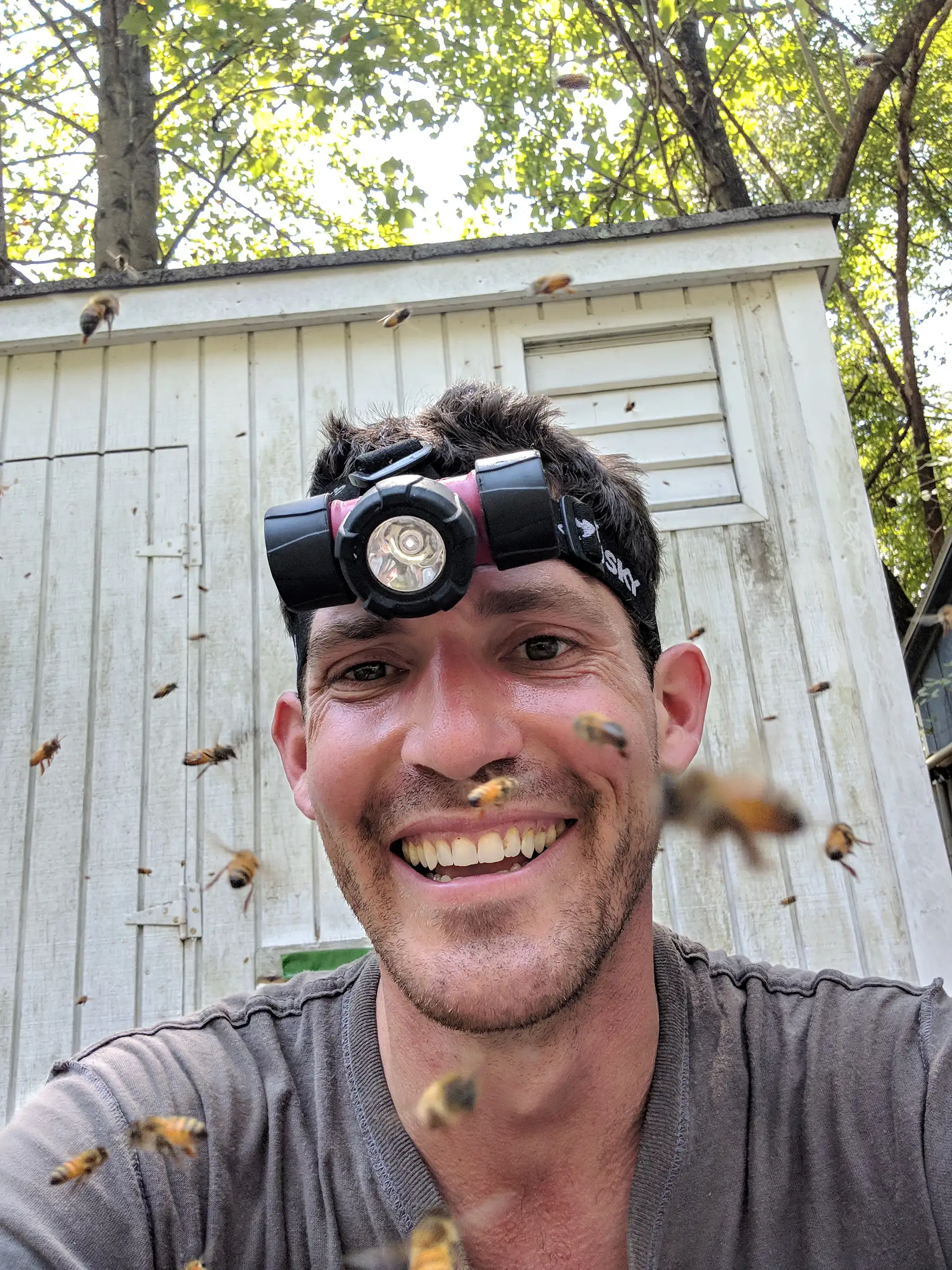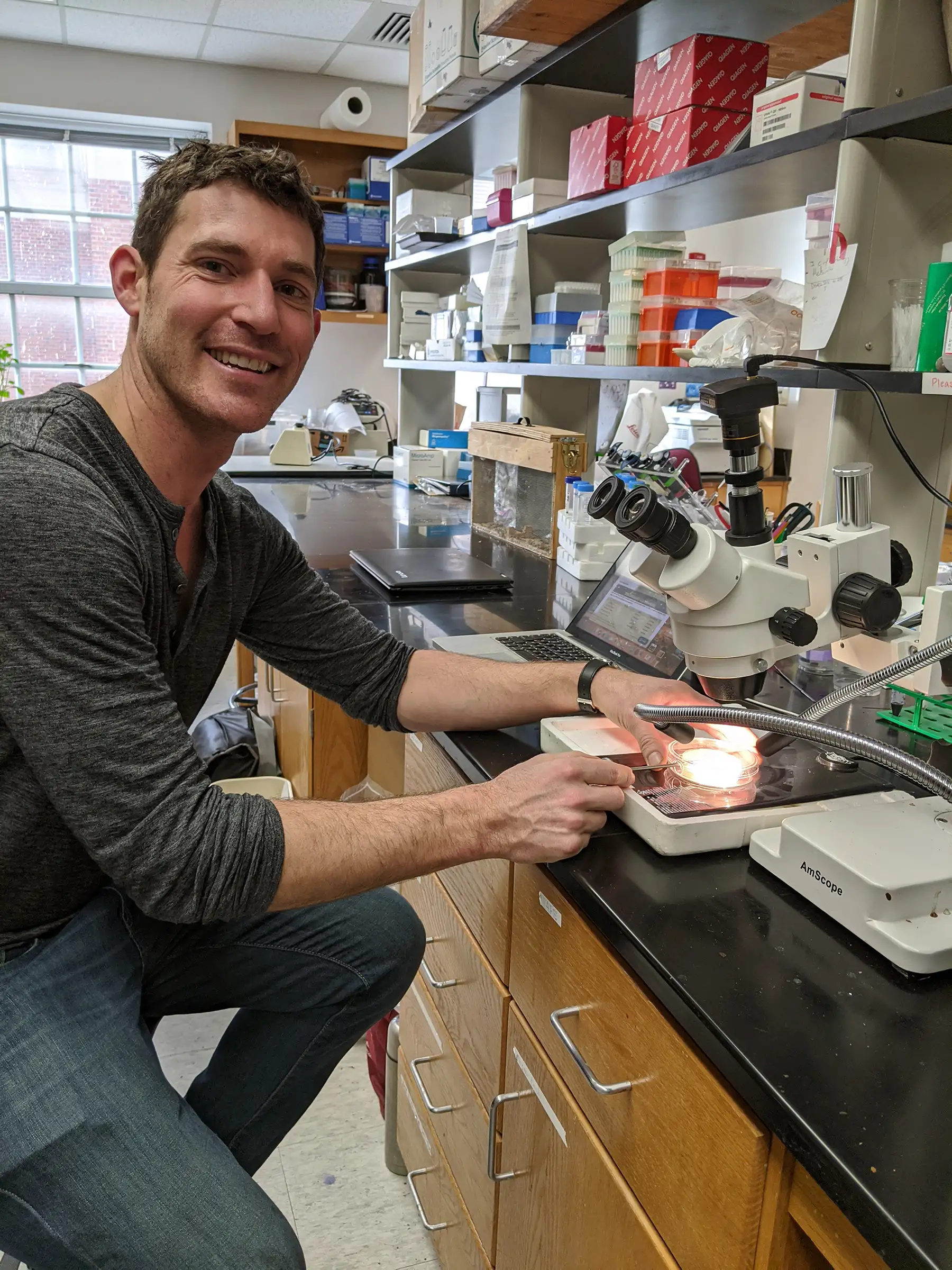Entomologist researches ways to save honeybees from parasitic mites
Meet Zachary Lamas
Zachary Lamas grew up with the importance of a college education heavily ingrained in his mind. Lamas’ father emigrated from Brazil and his mother grew up on a small dairy farm, leaving him and his brother without much guidance on how to create a pathway to college other than the statement, “work with your mind, not your hands.” Luckily, his fascination with learning developed at a young age on his grandfather’s farm in Salisbury, New Hampshire where he constantly observed anything that moved.

Lamas became a first-generation college student at Colby-Sawyer College where he studied biology. However, he struggled with envisioning a career with his degree other than the typical path of becoming a doctor, often leaving him feeling disassociated from his undergraduate schooling. Despite such feelings, Lamas resorted back to what he loved as a child and farmed, ultimately working as a commercial beekeeper.
After scaling up in the beekeeping business, Lamas decided to go back to school at the University of Maryland where he received his doctorate in entomology. His mentor, Jay Evans, Ph.D., encouraged him to apply to become an Oak Ridge Institute for Science and Education (ORISE) fellow with the United States Department of Agriculture and their Agricultural Research Service Research Participation Program (USDA ARS).
The USDA ARS Research Participation Program provides opportunities for students, postgraduates, established scientists and faculty to participate in programs, projects and activities at ARS-designated facilities to help ARS solve agricultural problems of high national priority.
Lamas’ research project revolves around the feeding behavior and distribution of Varroa destructor, a parasitic mite, on adult bees of Apis mellifera, also known as honeybees. Due to the dynamic nature of the vector-host-pathogen system, there are a lot of gaps in the current knowledge of interactions on adult bees. Lamas has already quantified the rate in which the parasitic mite feeds on bee colonies through previous research conducted through his doctorate program. He plans to build upon those findings with his current research and use that information to close the knowledge gaps.
“I study the parasitic mite behavior, and then ask how its behavior drives viral transmission,” he explained. “I am testing if parasitized nestmates are attractive to their nestmates or whether they are ostracized or self-ostracize. This is really fascinating because we can do the research with and without the pathogen present.”
Lamas’ research will accomplish more than fulfilling his wildest dreams, it will provide beekeepers and their colonies with a new sampling technique to predict fatal mite infestations along with a replacement treatment.
“It is getting more and more difficult for commercial beekeepers to keep colonies healthy and productive,” he said. “Eventually we want to be able to make a bait trap for beekeepers as an effective mite control.”

At the Bee Research Laboratory, Lamas sets up for experiments, collects samples at research yards and performs extraction on the lab bench. (Photo Credit: Zachary Lamas)
A typical day for Lamas at the Bee Research Laboratory can include a range of activities. Lamas’ mentor provides a flexible project assignment, allowing Lamas to collect extractions or be in the field setting up experiments and traveling to research yards to collect samples.
Lamas currently has two papers under review for scientific journal publications and plans to present his research findings at the 2023 American Honey Producers Association Conference and the 2024 American Bee Research Conference. He is also integral to USDA-wide efforts to help determine the causes of severe colony losses experienced by beekeepers early in 2023, by applying his insights into disease quantification and management. Lamas will complete his program in 2025 after which he has many career goals.
“I want to keep doing research,” he said. “I want to be a leader in my field and create a safe lab space where students can thrive. I want them to be as creative as I got to be pursuing my own ideas.”
Lamas expressed his gratitude to Judy Chen, Ph.D., and Evans for helping him discover the ORISE fellowship at USDA ARS as it helped him discover an opportunity that he, “never thought even existed.”
“I describe my fellowship as I get to make and play with puzzles every day,” Lamas said. “In short, that child that ran around on his grandfather’s farm still gets to play as an adult in STEM.”
The USDA ARS Research Participation Program is funded by USDA and is administered through the U.S. Department of Energy’s (DOE) Oak Ridge Institute for Science and Education (ORISE). ORISE is managed for DOE by ORAU.

